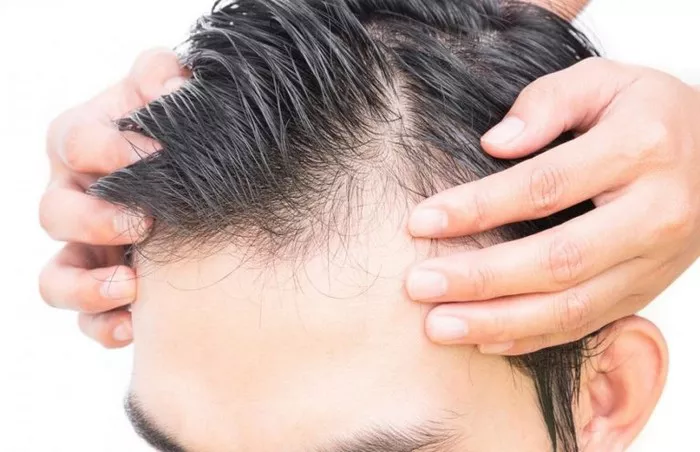Hair loss is a common concern for many individuals, affecting both men and women of various ages. While shedding a certain amount of hair each day is normal, experiencing a significant amount of hair loss can be distressing and may indicate underlying health issues. In this article, we will delve into the potential causes of excessive hair loss, its implications, and when it may be necessary to seek professional advice.
Normal Hair Growth Cycle
Before delving into the causes of excessive hair loss, it’s essential to understand the normal hair growth cycle. Hair grows in three distinct phases:
1. Anagen phase: This is the active growth phase of hair follicles, lasting anywhere from two to seven years. The hair on your scalp is actively growing during this phase.
2. Catagen phase: Also known as the transitional phase, this is a short period lasting about two weeks. During this phase, hair growth stops, and the outer root sheath shrinks, anchoring the hair to the follicle.
3. Telogen phase: Commonly referred to as the resting phase, this lasts around three months. During telogen, the hair follicle remains dormant, and old hairs are shed to make way for new ones.
After the telogen phase, the cycle repeats, with new hairs growing in place of the shed ones.
Causes of Excessive Hair Loss
Several factors can contribute to significant hair loss beyond the normal shedding rate. These include:
1. Genetics: One of the most common causes of hair loss is genetic predisposition. Androgenetic alopecia, also known as male or female pattern baldness, can lead to progressive thinning of the hair over time.
2. Hormonal Changes: Hormonal fluctuations, such as those experienced during pregnancy, childbirth, menopause, or thyroid disorders, can disrupt the normal hair growth cycle and lead to increased shedding.
3. Medical Conditions: Certain medical conditions, including autoimmune diseases like alopecia areata, scalp infections, and chronic illnesses like lupus or diabetes, can cause hair loss as a secondary symptom.
4. Nutritional Deficiencies: Inadequate intake of essential nutrients, such as iron, protein, and vitamins, can impair hair growth and lead to excessive shedding.
5. Stress: Physical or emotional stress can trigger a type of hair loss called telogen effluvium, where a significant number of hairs prematurely enter the resting phase and are subsequently shed.
6. Medications and Treatments: Some medications, such as chemotherapy drugs, antidepressants, and blood thinners, can cause hair loss as a side effect. Additionally, harsh treatments like chemotherapy and radiation therapy can lead to temporary or permanent hair loss.
7. Trauma or Injury: Physical trauma to the scalp, such as from a surgical procedure, accident, or excessive styling practices like tight ponytails or braids, can damage hair follicles and result in hair loss.
Implications of Significant Hair Loss
Experiencing noticeable hair loss can have several implications, both physical and emotional, including:
1. Decreased Self-Esteem: Many individuals associate their hair with their identity and self-esteem. Significant hair loss can lead to feelings of self-consciousness, embarrassment, and diminished confidence.
2. Psychological Distress: Hair loss can cause significant psychological distress, leading to anxiety, depression, and social withdrawal in some cases.
3. Altered Appearance: Excessive hair loss can dramatically alter one’s appearance, potentially changing how they perceive themselves and how others perceive them.
4. Impact on Relationships: Changes in physical appearance due to hair loss may affect personal relationships and intimacy, particularly if individuals feel less attractive or desirable as a result.
5. Potential Health Concerns: While not all cases of hair loss indicate underlying health issues, it can sometimes be a symptom of an underlying medical condition that requires attention and treatment.
When to Seek Professional Advice
While some degree of hair loss is normal, significant or sudden hair loss should prompt a visit to a healthcare professional or dermatologist. It’s essential to seek professional advice if:
1. Hair Loss is Sudden or Severe: If you notice a sudden increase in hair shedding or significant thinning of the hair, it’s crucial to consult a healthcare provider to determine the underlying cause.
2. Hair Loss is Accompanied by Other Symptoms: If hair loss is accompanied by symptoms such as itching, redness, scalp tenderness, or changes in the skin on the scalp, it may indicate an underlying scalp condition that requires medical attention.
3. Hair Loss is Impacting Quality of Life: If hair loss is causing significant distress, affecting self-esteem, or interfering with daily life activities, it’s essential to seek support from a healthcare professional or mental health provider.
4. You Have a Family History of Hair Loss: If you have a family history of hair loss or are concerned about genetic predisposition to baldness, discussing your concerns with a dermatologist can help explore preventive measures or treatment options.
5. You’re Experiencing Hair Loss After Pregnancy or Illness: Hormonal changes, stress, or medical conditions can trigger temporary hair loss. If you’re experiencing hair loss following pregnancy, illness, or other significant life events, consulting a healthcare provider can help identify potential underlying causes and appropriate management strategies.
Conclusion
Experiencing significant hair loss can be a distressing and challenging experience for many individuals. While it’s normal to shed some hair each day, excessive or sudden hair loss may indicate an underlying health issue that requires attention and treatment. By understanding the potential causes of hair loss, its implications, and when to seek professional advice, individuals can take proactive steps to address the issue and maintain scalp and hair health. Whether through lifestyle modifications, medical interventions, or psychological support, there are various resources available to help individuals cope with and manage hair loss effectively.


